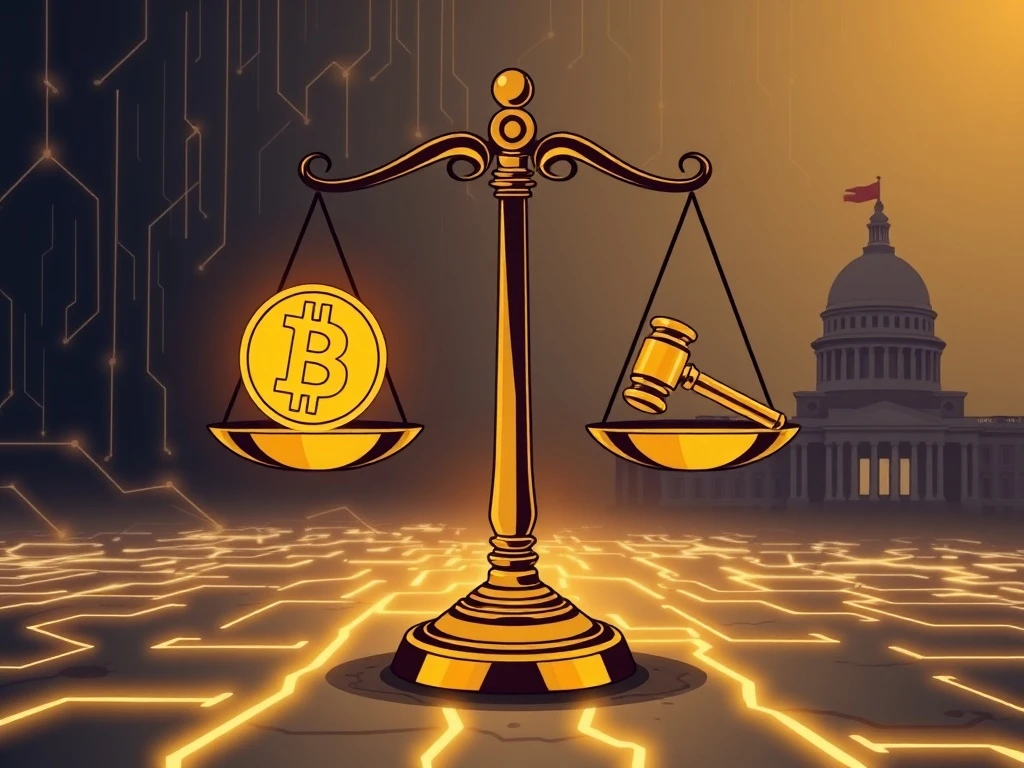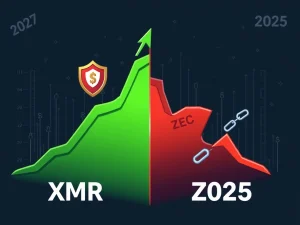DOJ Crypto Enforcement: Unprecedented Charges Loom for DragonFly Over Tornado Cash Ties

The cryptocurrency world is abuzz with news that the U.S. Department of Justice (DOJ) is reportedly considering charges against employees of DragonFly, a prominent venture capital firm. This development, linked to the ongoing trial of Tornado Cash co-founder Roman Storm, signals a significant escalation in DOJ crypto enforcement, extending accountability beyond direct operators to those who financially support or contribute to decentralized applications (dApps). This move sends a clear message: the regulatory net is widening, and the implications for the broader blockchain industry, particularly in the realm of DeFi, are profound.
Unpacking the DOJ’s Focus: Tornado Cash Charges and DragonFly’s Legal Entanglement
At the heart of this unfolding drama are the severe Tornado Cash charges. The privacy-focused Ethereum mixer has been sanctioned by the U.S. Treasury for allegedly facilitating illicit transactions, including ransomware payments. While Tornado Cash operates as an open-source project, the DOJ’s current investigations suggest a willingness to hold a broader range of stakeholders accountable. The trial of Roman Storm, one of Tornado Cash’s co-founders, has brought to light the DOJ’s interest in expanding the scope of liability. During court proceedings, emails exchanged between Storm and DragonFly General Partner Tom Schmidt were presented, revealing discussions about implementing Know-Your-Customer (KYC) procedures for the platform. This interaction underscores the intricate connections between venture capital firms and the projects they fund, even those designed for maximum decentralization.
However, the plot thickened when Schmidt invoked the Fifth Amendment, refusing to testify to avoid self-incrimination. This legal maneuver highlights the delicate balance authorities must strike when prosecuting entities involved in open-source projects, where traditional notions of control and responsibility are often blurred. The potential for DragonFly legal issues stemming from these ties is a stark reminder that investment in the crypto space, particularly in privacy-enhancing tools, now carries heightened regulatory risk. As the Storm trial nears its closing arguments, the crypto community watches with bated breath, understanding that its outcome could set a critical precedent for future enforcement actions.
The Expanding Reach of DOJ Crypto Enforcement: A Broader Strategy
The DOJ’s potential action against DragonFly employees is not an isolated incident; rather, it reflects a calculated and expanding strategy in DOJ crypto enforcement. This approach aims to hold entities accountable for technologies that, while potentially legitimate, can also be used to facilitate financial crimes. Tornado Cash serves as a prime example of such ‘dual-use’ technology. By targeting firms like DragonFly, the DOJ appears to be signaling that liability may extend beyond the direct developers or operators to investors and other contributors who profit from or enable tools with potential for misuse. This strategy aligns with a 2023 case where a developer was convicted for creating software that circumvented U.S. export controls, establishing a precedent for prosecuting those who contribute to technologies with potential illicit applications. The message is clear: the U.S. government is increasingly assertive in its efforts to regulate the digital asset landscape, moving beyond simple sanctions to direct criminal charges against individuals and firms perceived to be enabling illicit activity.
Navigating DeFi Regulation and Its Implications for Innovation
The implications for DeFi regulation are profound. The decentralized finance sector, built on the principles of open-source code and permissionless access, faces unique challenges when confronted with traditional legal frameworks. Critics argue that such aggressive prosecutions could stifle innovation, creating an environment of uncertainty for developers, investors, and users alike. Open-source projects, which thrive on community collaboration and decentralized governance, may find it increasingly difficult to attract funding or contributors if financial or advisory roles carry the risk of criminal exposure. The core tension lies between fostering technological advancement and ensuring compliance in an industry where traditional regulatory models often fall short. Balancing these competing interests will be crucial for the healthy development of the DeFi ecosystem. For firms like DragonFly, which play a pivotal role in funding and nurturing nascent crypto projects, this increased scrutiny necessitates a re-evaluation of their due diligence processes and risk assessment frameworks.
Establishing Blockchain Liability: A New Legal Frontier
The question of blockchain liability is perhaps the most critical aspect of these ongoing legal battles. While Tornado Cash functions as an open-source project without a single controlling entity, the DOJ’s focus on DragonFly suggests a willingness to attribute accountability based on financial or strategic support rather than direct technical control. This could set a new legal framework where financial incentives become a basis for liability, a significant departure from traditional legal interpretations of responsibility in software development. For the broader blockchain industry, this means projects that prioritize privacy or extreme decentralization may face heightened regulatory risks, especially if they attract investment from firms that authorities perceive as enabling illicit activity. The legal community is grappling with how existing laws, designed for centralized entities, can be effectively applied to decentralized systems. This case will undoubtedly influence how governments globally approach the regulation of decentralized finance and privacy-enhancing technologies, forcing a re-evaluation of what constitutes ‘control’ and ‘responsibility’ in the digital age.
Challenges and Considerations for the Crypto Industry
- Innovation vs. Compliance: The ongoing struggle to balance technological progress with the imperative to prevent financial crime.
- Defining Liability: The difficulty in attributing responsibility in decentralized, open-source environments where no single entity holds complete control.
- Chilling Effect: The risk that aggressive enforcement actions could deter legitimate developers and investors from participating in the DeFi space.
- Global Harmonization: The challenge of establishing consistent regulatory frameworks across different jurisdictions for inherently global technologies.
As the trial unfolds, the outcome will likely influence future policies on decentralized finance and the global response to privacy-focused technologies. The DOJ’s decision to pursue charges against DragonFly employees—if confirmed—could serve as a test case for how governments apply existing legal frameworks to decentralized systems. For now, stakeholders in the blockchain industry are closely monitoring developments, recognizing that the DOJ’s actions may shape the regulatory trajectory of digital assets for years to come.
Frequently Asked Questions (FAQs)
What is the core issue in the DOJ’s investigation involving DragonFly and Tornado Cash?
The core issue is the U.S. Department of Justice (DOJ) reportedly considering charges against employees of DragonFly, a venture capital firm, due to its ties and alleged support for Tornado Cash. Tornado Cash, an Ethereum mixer, has been sanctioned by the U.S. Treasury for facilitating illicit transactions, and the DOJ is investigating accountability for entities that enable such platforms.
Why is the DOJ targeting DragonFly, a venture capital firm, rather than just the developers of Tornado Cash?
The DOJ’s focus on DragonFly signals a broader strategy to extend accountability beyond direct operators to those who provide financial or strategic support to decentralized applications (dApps) that can be used for illicit purposes. This suggests that financial incentives and enabling roles, not just technical control, could become a basis for blockchain liability.
How do these potential charges impact DeFi regulation and innovation?
These potential charges could significantly impact DeFi regulation by setting a precedent for increased scrutiny on decentralized projects, particularly those focused on privacy. Critics worry it could stifle innovation by creating uncertainty for developers and investors, making them hesitant to fund or contribute to open-source projects that might face regulatory backlash.
What is the significance of Tom Schmidt invoking the Fifth Amendment in the Roman Storm trial?
Tom Schmidt, a General Partner at DragonFly, invoked the Fifth Amendment to avoid self-incrimination during the Roman Storm trial. This highlights the legal complexities of prosecuting entities involved in open-source projects, where responsibility is decentralized, and individuals may fear legal repercussions for their involvement or knowledge.
What does this case mean for the future of blockchain liability?
This case is crucial for defining future blockchain liability. It suggests that liability may extend to firms that provide financial or strategic support to decentralized projects, even if they don’t have direct technical control. This could establish a new legal framework where financial incentives, rather than just technical control, become a basis for accountability in the crypto space.
What are ‘dual-use’ technologies in the context of this case?
‘Dual-use’ technologies refer to tools or platforms that can be employed for both legitimate and criminal purposes. Tornado Cash is considered a dual-use technology because while it offers privacy features for legitimate users, it has also been used to launder funds from illicit activities like ransomware, making it a target for DOJ crypto enforcement.









